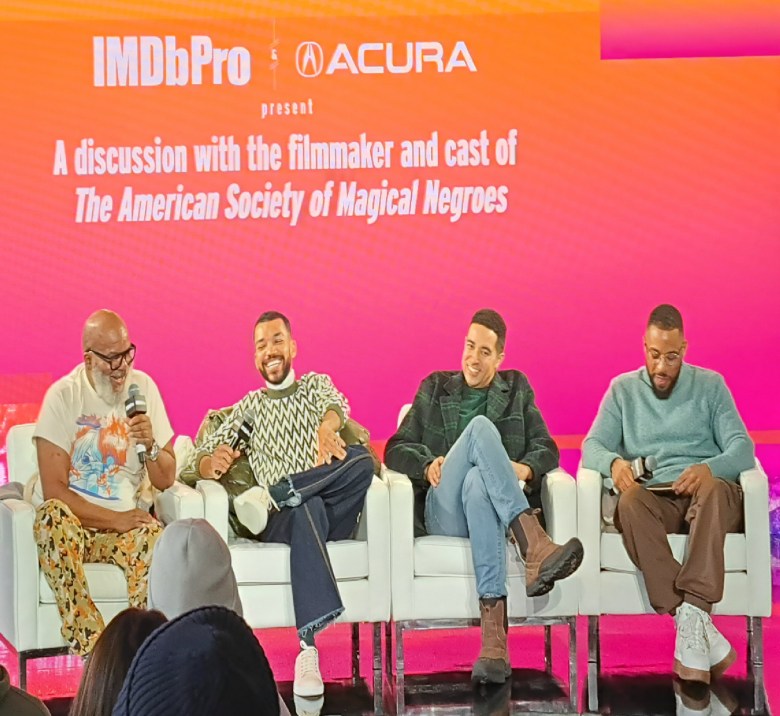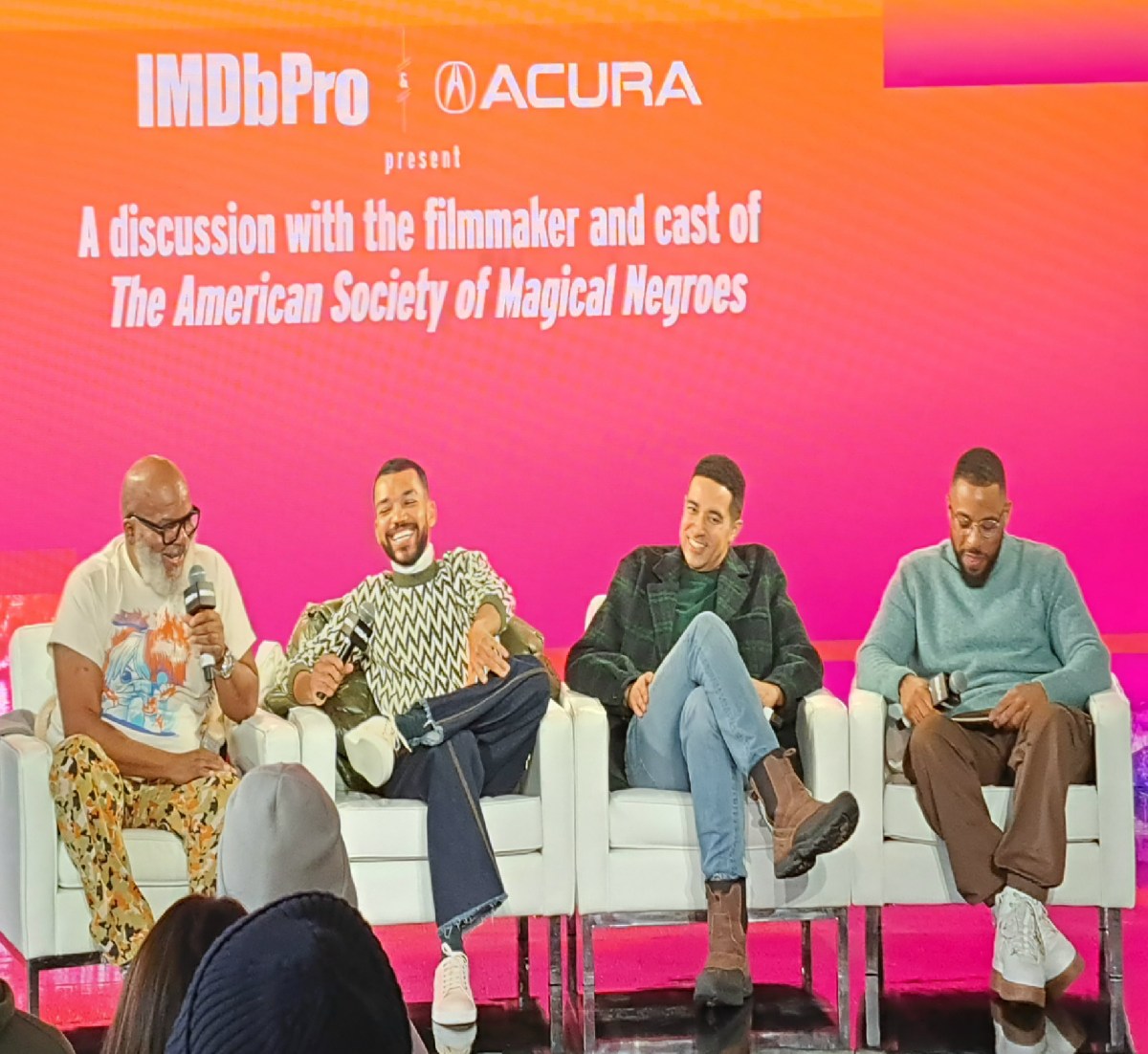
Although Kobi Libii’s feature film debut, “The American Society of Magical Negroes,” which premiered at the 2024 Sundance Film Festival, is a satirical comedy, working on the project triggered an emotional memory that actor and comedian David Alan Grier heard about his great-aunt.
“(It was in) 1930 Mississippi and Alabama (when) she got dressed up in her Sunday best and got her hair done, because she was going to visit friends a few towns over,” he said during a panel discussion about the film on Sunday at the Acura House of Energy. “She had to go on the bus to travel there. As the bus filled up, the bus driver pulled over in the middle of nowhere and told her she had to give up her seat for these white folks.”
Grier’s great-aunt asked where she was supposed to go, and the bus driver said, “You can ride underneath the bus with the luggage.”
“So, they put her under there, and when they got to the destination, they left her there for hours,” Grier said, his voice filled with emotion. “She became hysterical. She kicked. She banged. She screamed. She pleaded, until finally this group of white men, workers, let her out, laughing at her.”
When Grier asked his grandmother why her sister didn’t fight back, she wouldn’t say.
“She never told me they would lynch her, but it was obvious as I got older,” he said.
That story served as fodder for Grier’s character of Roger, who is sort of a mentor to Aren, played by Justice Smith in Libii’s film.
“So, when my character is telling Aren how you make it (in life) and I tell him my (character’s) story, I really know those stories,” Grier said. “They are part of my DNA.”
The DNA of that pain is bottled up and passed down to the next generation, he said.
“Even though you try not to, and we’ve accomplished great things, it’s still there,” he said. “And it gets triggered. And it comes out in ways and situations that we’re not aware of. I haven’t told that story in decades. It’s this movie that triggered all of that. But it’s good. It’s good. It’s good.”
Grier told the audience and panel — which included Smith and Libii and was moderated by Tre Wesley, video producer for IMDb — that his great-aunt’s story isn’t unique to her, him or his family.
“So many Black people and Black families have similar stories,” he said. “And that was kind of what I was trying to portray and convey to Justice’s character, through my portrayal. That’s (also) nothing I had to study. It’s just there.”
Libii, who is a writer, actor and comedian, said the original idea for the story at two-minute sketch started with what is known as the “Magical Negro” trope.
“I think of the Magical Negro as a Black supporting character who doesn’t have his or her own internal life,” Libii said. “They’re just there to help support the white protagonist’s journey.”
Libii sat down to write, and “came up for air a couple of hours later.”
“(I) sat back and asked, ‘What am I working on?’ because I realized I was processing something more personal than just attacking the trope,” he said. “What I was exploring, and what I believe the film is ultimately about, is this very particular defense mechanism I was taught about how to survive in America — which is to make powerful white people comfortable.”

The film is a critique that imagines being a “Magical Negro” is a real job, Libii said.
“It’s a secret underground society, a world beneath our world, where these Black people use literally magical powers to support these white clients,” he said. “It’s also a fun magical world where we can play, and think of some of the fantastical things that Black people have to do to survive in America.”
Much of the need to write the script came from Libii’s own childhood, when his father sat him down for a talk.
“(He) said, ‘This is how you have to act around the police to stay alive,'” Libii remembered. “‘You don’t worry about your pride. You just keep yourself safe. You’re nice. You’re polite. You say, ‘Sir.””
Libii said he believes he “overlearned those lessons.”
“I believe it influenced how I move through the world, and the way I relate to white people,” he said.
Reflecting on his life, Libii said writing the script for “The American Society of Magical Negros” was cathartic, but also disturbing.
“Magical Negroes are Black folks who are only focused on white people, and hyper focused on white comfort, and I find myself identifying with them in a very troubling way,” he said. “It was also troubling and quite embarrassing thing to see that in myself.”
Taking on the role as Aren also felt purgative for Smith.
“There’s this powerful monologue Kobi wrote at the end of the film, and I really didn’t have to do much preparation for it,” Smith said. “I just had to learn the words. And learning the words was very easy, because I was just speaking my truth.”
Smith feels forever changed after working with Libii on this film.
“I learned so much about myself, and I found that I make a lot of space for white people, and I should do less of that,” he said. “I feel like I’m a more unapologetic person. I feel like I have a right to exist. And I’m waiting for American society so I can extend that growth. I set out to be an actor to experience catharsis, and this movie was the return to that original motivation.”
Libii’s ultimate goal with the film is to forgive himself for “over-learning” the defense mechanisms his father taught him.
“I want to offer that grace to other Black people and other people of color,” he said. “More importantly, (it’s) to shift the blame. Because it’s not my fault that my dad had to teach me that. It’s structural racism’s fault that we were coerced into needing those kinds of defense mechanisms to navigate this country. That’s one of the things that happened for me personally when writing this, that I hope will connect with a broader audience.”
Libii knows, however, that there is still a long way to go.
“One of the things I’m obsessed with in Black History is that we’re still really uncomfortable centering and celebrating a story like the story of (Grier’s) great-aunt,” he said. “We’d rather celebrate a story about Rosa Parks, who resisted and got to look like the hero, because she didn’t go under the bus, as opposed to recognizing the absolute strength, the will, the grit, it took to get through (being) under the bus. To me, that’s heroism. We haven’t respected the legacy of people like that who just had to endure. The heroism (is) enduring the rigors that this country has put Black people through.”

